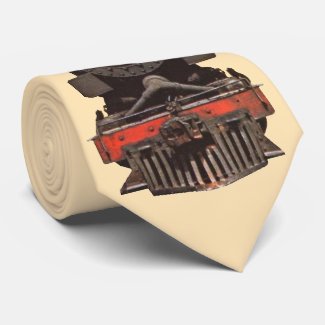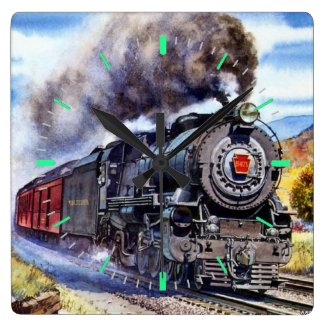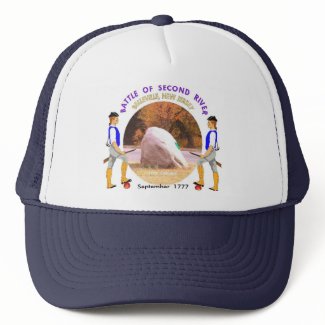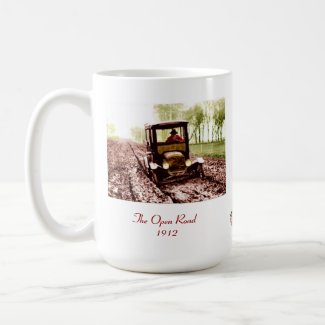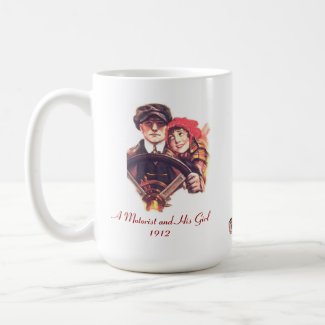The Old Town Miser
There are certain squeaking, creaking sounds that will transport an old-timer back to his childhood in an instant. Take for example the squeak-squeak-bang of the old back porch screen door opening and closing on its rusty old spring hinges or, the squeal-squeak, squeal-squeak of the next door neighbors clothes line being reeled in ... ah yes, shades of 1950. But there are other squeaking noises which can electrify your spine and raise the hair on the back of your neck.
-
When you are out and about on Halloween or on All Saints Day this year, keep an ear tuned for a queer sort of sound, the chilling sound of a certain squeaky wheel that can be heard here in the village. The wheel is attached to a rickety old wheelbarrow. The wheelbarrow belongs to the musty old town miser. Perhaps it wouldn't squeak so if the old skinflint oiled it once in a while, but far be it from him to pay the cost for a drop of oil to make it quiet. What makes the sound so queer is that the old miser hasn't been around much since he passed on some time after the late 1850's, yet this squeak-a-squeak still echoes here and there on our streets. What really draws your attention to the squeaky, creaky, rattling old wheelbarrow is how it is often accompanied by the somber voice of the old Dutch Aanspreker and his companion, the Huilebalk. Now that needs a bit of explaining, especially for the benefit of the younger generation who are unaware of how things used to be here in the village.
The Aanspreker was a sort of undertaker in the old Dutch village and one of his duties was to go from house to house to announce the passing of a villager. "Please, ma'am, the baker's compliments, and he's dead." Such message would be followed by the time and place of interment and then the weeping and wailing of the Huilebalk, a professional mourner who would follow the Aanspeker on his rounds to ensure the proper sentiment was established.
Now, the oddity of it all came about at the time of the passing of the old miser's wife. The truth of it was that he was not a poor man, on the contrary, he was rather well-to-do, but he was known to be frugal to what some folks thought was an extreme. He was so universally referred to as "The Old Miser" along with some colorful metaphors, that his actual name has been lost to us. On this sad occasion in his life, he still had the presence of mind to save the usual costs of a funeral by serving himself in the customary capacities. He hefted his late wife into his old wheelbarrow and while playing the roll of Aanspeker, Huilebalk, and poll bearers, hauled her to her resting place. He had not been well loved by the townfolks to begin with and this remarkable spectacle did nothing to enhance his standing in the community.
At a later time, when it was his own time to cross the great divide, the occurrence of it went so unnoticed in the village that no record of it can be found, no doubt to save the cost of keeping such record. However there are those on the other side who take notice of aberrant mortal behavior and who assign appropriate corrective tasks to those new arrivals who seem in need of them. Thus it was given to the Old Miser to push his rickety, squeaking old wheelbarrow about the streets of the village for all time and to invite, with all proper courtesies, those who may appear about ready, to ride in the barrow to their final place. And so it is that the sound of old, squeaky wheels are not well received hereabouts.
The original teller of this tale, the Reverend Thomas DeWitt Talmage of the old Dutch Church, had still another anecdote to relate to us about this character from our village saga. Here it is in his own words -
"I was ready for him when one morning he called at the parsonage. As he entered he began by saying: “I came in to say that I don’t like you.” “Well,” I said, “that is a strange coincidence, for I cannot bear the sight of you. I hear that you are the meanest man in town and that your neighbors despise you.”
Notwithstanding this spirited meeting, the man eventually became a great friend of the young pastor. Eventually he even asked Talmage to officiate when he decided to take onto himself a new wife.
Talmage goes on - "The entire town was awake that night. They had somehow heard that this economist at obsequies was to be remarried. While I was inside the house trying, under adverse circumstances, to make the twain one flesh, there were outside demonstrations most extraordinary, and all in consideration of what the bridegroom had been to the community. Horns, trumpets, accordions, fiddles, firecrackers, tin pans, howls, screeches, huzzas, halloo, missiles striking the front door and bedlam let loose! Matters grew worse as the night advanced, until town authorities read the riot act, and caused the only cannon belonging to the village (a Revolutionary War relic) to be hauled out on the street and loaded, threatening death to the mob if they did not disperse. Glad am I to say that it was only a farce and no tragedy."
-
Be that as it may, there are still those who know about the Old Miser and dread the sound of that squeak-a-squeak for fear that it might be following them to offer them a ride to that other place. Indeed, if you hear the squeak 'n creak 'n rattle of the barrow accompanied by the voice of the Aanspreker and the wails and moans of the Huilebalk on this Halloween, you may be in trouble. Do not look to see who it is. Definitely do not offer to oil the wheel. And it is best to not ask for whom the wheel squeaks ... just turn and run.
The Aanspreker was a sort of undertaker in the old Dutch village and one of his duties was to go from house to house to announce the passing of a villager. "Please, ma'am, the baker's compliments, and he's dead." Such message would be followed by the time and place of interment and then the weeping and wailing of the Huilebalk, a professional mourner who would follow the Aanspeker on his rounds to ensure the proper sentiment was established.
Now, the oddity of it all came about at the time of the passing of the old miser's wife. The truth of it was that he was not a poor man, on the contrary, he was rather well-to-do, but he was known to be frugal to what some folks thought was an extreme. He was so universally referred to as "The Old Miser" along with some colorful metaphors, that his actual name has been lost to us. On this sad occasion in his life, he still had the presence of mind to save the usual costs of a funeral by serving himself in the customary capacities. He hefted his late wife into his old wheelbarrow and while playing the roll of Aanspeker, Huilebalk, and poll bearers, hauled her to her resting place. He had not been well loved by the townfolks to begin with and this remarkable spectacle did nothing to enhance his standing in the community.
At a later time, when it was his own time to cross the great divide, the occurrence of it went so unnoticed in the village that no record of it can be found, no doubt to save the cost of keeping such record. However there are those on the other side who take notice of aberrant mortal behavior and who assign appropriate corrective tasks to those new arrivals who seem in need of them. Thus it was given to the Old Miser to push his rickety, squeaking old wheelbarrow about the streets of the village for all time and to invite, with all proper courtesies, those who may appear about ready, to ride in the barrow to their final place. And so it is that the sound of old, squeaky wheels are not well received hereabouts.
The original teller of this tale, the Reverend Thomas DeWitt Talmage of the old Dutch Church, had still another anecdote to relate to us about this character from our village saga. Here it is in his own words -
"I was ready for him when one morning he called at the parsonage. As he entered he began by saying: “I came in to say that I don’t like you.” “Well,” I said, “that is a strange coincidence, for I cannot bear the sight of you. I hear that you are the meanest man in town and that your neighbors despise you.”
Notwithstanding this spirited meeting, the man eventually became a great friend of the young pastor. Eventually he even asked Talmage to officiate when he decided to take onto himself a new wife.
Talmage goes on - "The entire town was awake that night. They had somehow heard that this economist at obsequies was to be remarried. While I was inside the house trying, under adverse circumstances, to make the twain one flesh, there were outside demonstrations most extraordinary, and all in consideration of what the bridegroom had been to the community. Horns, trumpets, accordions, fiddles, firecrackers, tin pans, howls, screeches, huzzas, halloo, missiles striking the front door and bedlam let loose! Matters grew worse as the night advanced, until town authorities read the riot act, and caused the only cannon belonging to the village (a Revolutionary War relic) to be hauled out on the street and loaded, threatening death to the mob if they did not disperse. Glad am I to say that it was only a farce and no tragedy."
-
Be that as it may, there are still those who know about the Old Miser and dread the sound of that squeak-a-squeak for fear that it might be following them to offer them a ride to that other place. Indeed, if you hear the squeak 'n creak 'n rattle of the barrow accompanied by the voice of the Aanspreker and the wails and moans of the Huilebalk on this Halloween, you may be in trouble. Do not look to see who it is. Definitely do not offer to oil the wheel. And it is best to not ask for whom the wheel squeaks ... just turn and run.

















